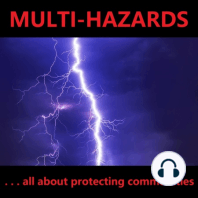90 min listen

Environmental Racism with Dr. Ingrid Waldron
Environmental Racism with Dr. Ingrid Waldron
ratings:
Length:
67 minutes
Released:
Oct 9, 2021
Format:
Podcast episode
Description
Can the environment be racist? No, but those with power can use it to further marginalise racialised communities. Industries, landfills and other large and small-scale projects are seldom put into affluent White neighbourhoods by the government and corporations, but more often where Indigenous, Black and Brown people live. Today the Multi-Hazards Podcast features Dr. Ingrid Waldron, professor at McMaster University, author of There’s Something in the Water: Environmental Racism in Indigenous and Black Communities and co-producer of the documentary film of the same name on Netflix. Join us as we discuss environmental racism and how communities and their allies are fighting for environmental justice. Direct download: https://traffic.libsyn.com/secure/multi-hazards/Environmental_Racism_with_Dr_Ingrid_Waldron.mp3 Best-looking link: https://directory.libsyn.com/episode/index/id/20763668 Study Guide here, click where it says "PDF" on the middle left: https://multi-hazards.libsyn.com/environmental-racism-with-dr-ingrid-waldron Topics include: * What exactly is "environmental racism"? "Racialised communities"? * Where do the communities that are often targeted by governments and corporations and their environmental racism live? * How has Ingrid's background and journey led her into this topic? * Why is environmental racism a very political topic? * Why are sociologists just as important as environmental scientists to deal with the social aspects of the environment? * How is environmental racism different from the term "environmental justice"? * How does environmental racism fit into the big picture of systemic racism that includes "high unemployment rates, income insecurity, poverty, food insecurity, poorly resourced neighbourhoods," etc.? * What is "intersectionality"? Who first used this phrase and why? What are the various elements that can "intersect"? * Why would, for example, landfills or industries, not be placed in or near white upper or middle class communities? What do they have that racialised communities do not have? * What are the "social determinants of health"? * What are some of the social institutions where racism is embedded in? * How did Ingrid get connected with actor Elliott Page? * Why did releasing the "There's Something in the Water" film on Netflix right when the global pandemic first arrived ensure more people watched? Why was this such a huge coincidence? * Why was the film's emotional impact so obvious? * Who are the Mikmaq First Nations and also the African Nova Scotians? What kind of environmental racism happened to their communities? * What kinds of resistance, mobilising and activism are Indigenous and Black communities using in their fight against environmental racism? * Beyond political resistance, why is policy making so important? * Why is raising awareness so crucial? * What needs to change in the Canadian education system? Why are young people a priority to reach? * Why do White folks have difficulty empathising with Black, Indigenous and other racialised communities? * Why do the media focus on White women who are murdered and missing and most often ignore the ones who are non-White? * What are some exciting new developments in the fight against environmental racism? Dr. Ingrid Waldron's Bio: Dr. Ingrid Waldron (MA, University of London; PhD, University of Toronto) is the HOPE Chair in Peace and Health in the Global Peace and Social Justice Program in the Faculty of Humanities at McMaster University. She teaches Peace, Environment and Health and Race, Place & Geographies of Violence in Indigenous & Black Communities (Special Topics Course) in the Global Peace and Social Justice Program in the Faculty of Humanities. She also teaches Social Justice Perspectives on Gender and Health in the Gender Studies and Feminist Research Graduate Program in the Faculty of Humanities. Dr. Waldron is the author of There’s Something in the Water: Environmental Racism in Indigenous and Black Communities (
Released:
Oct 9, 2021
Format:
Podcast episode
Titles in the series (92)
Indigenous Perspectives on Adapting to Climate Change - Interview with Kerry-Ann Charles-Norris: Multi-Hazards Podcast S01 E19 by The Multi-Hazards Podcast